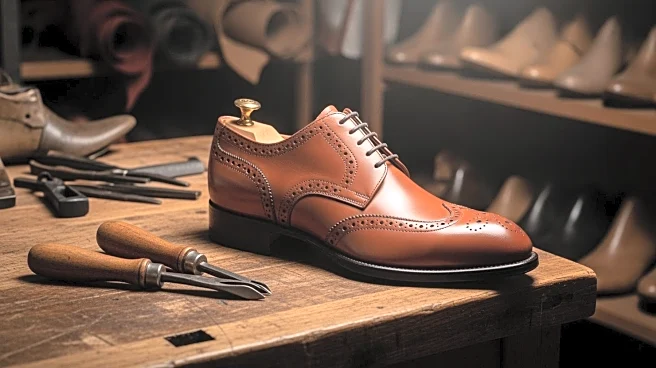What's Happening?
Daniel Day-Lewis, a major star of the '80s and '90s, temporarily renounced acting in 1999 to take up shoemaking. Born in London on April 29, 1957, Day-Lewis is the son of poet laureate Cecil Day-Lewis and actress
Jill Balcon. He trained at the Bristol Old Vic and joined the Royal Shakespeare Company in the late '70s. Day-Lewis gained recognition for his versatility in roles such as Cecil Vyse in 'A Room with a View' and a gay punk in 'My Beautiful Laundrette'. His performance as Christy Brown in 'My Left Foot' earned him an Oscar and BAFTA award. He continued to establish himself in US films like 'The Unbearable Lightness of Being' and 'The Last of the Mohicans'. Despite his success, Day-Lewis withdrew from a stage production of 'Hamlet' in 1989, citing exhaustion.
Why It's Important?
Day-Lewis's decision to step away from acting highlights the intense pressure and stress associated with the profession. His temporary departure from the industry underscores the challenges faced by actors who immerse themselves deeply in their roles. This move also reflects the broader issue of mental health in the entertainment industry, where the demands of fame and performance can lead to burnout. Day-Lewis's choice to pursue shoemaking suggests a need for creative outlets beyond acting, which may inspire other artists to explore diverse interests.
What's Next?
Day-Lewis returned to acting with 'Gangs of New York' in 2002, indicating a renewed interest in the craft. His comeback may influence other actors to take breaks for personal growth and mental health. The industry might see a shift towards supporting actors in finding balance between their professional and personal lives. As Day-Lewis continues to choose roles that challenge him, his career trajectory could inspire a new generation of actors to prioritize their well-being while pursuing their passion.
Beyond the Headlines
Day-Lewis's approach to acting, characterized by total immersion in roles, raises questions about the ethical implications of method acting. His intense preparation methods, such as living in a wheelchair for 'My Left Foot', highlight the potential physical and emotional toll on actors. This could lead to discussions about the sustainability of such practices and the need for support systems within the industry. Additionally, his career choices reflect a broader cultural shift towards valuing authenticity and personal fulfillment over traditional measures of success.










